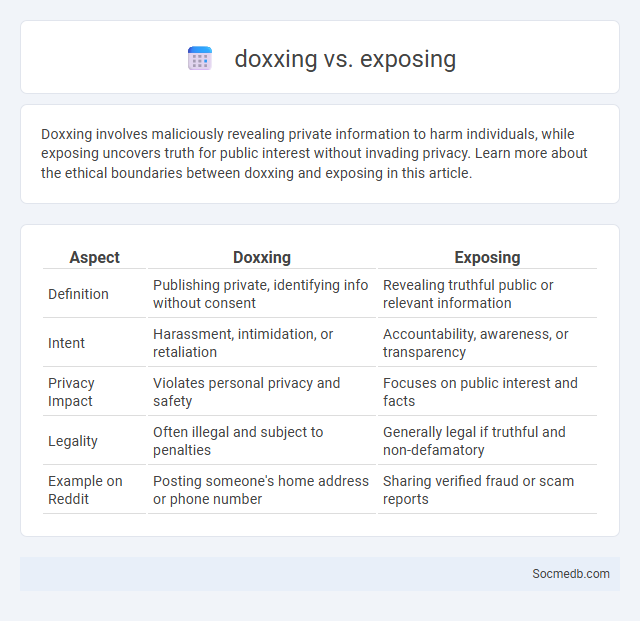
Photo illustration: doxxing vs exposing
Doxxing involves maliciously revealing private information to harm individuals, while exposing uncovers truth for public interest without invading privacy. Learn more about the ethical boundaries between doxxing and exposing in this article.
Table of Comparison
| Aspect | Doxxing | Exposing |
|---|---|---|
| Definition | Publishing private, identifying info without consent | Revealing truthful public or relevant information |
| Intent | Harassment, intimidation, or retaliation | Accountability, awareness, or transparency |
| Privacy Impact | Violates personal privacy and safety | Focuses on public interest and facts |
| Legality | Often illegal and subject to penalties | Generally legal if truthful and non-defamatory |
| Example on Reddit | Posting someone's home address or phone number | Sharing verified fraud or scam reports |
Understanding Doxxing: Definition and Origins
Doxxing involves the intentional release of private or identifying information about an individual without their consent, often to intimidate or harass. Originating from hacker culture, the term "dox" is derived from "documents," signifying the exposure of sensitive data. Understanding doxxing is crucial for your online safety and privacy management in the digital age.
What Does It Mean to Expose Someone Online?
Exposing someone online entails revealing personal, confidential, or damaging information about an individual on digital platforms without their consent, often leading to public shame or harassment. This act can involve sharing private messages, images, or secrets, potentially causing emotional distress or reputational harm. Understanding the ethical and legal implications of online exposure is critical as it impacts privacy rights and digital safety.
Personal Information Doxxing: Key Threats and Risks
Personal information doxxing on social media exposes users to identity theft, cyberstalking, and harassment by publicly revealing sensitive data such as addresses, phone numbers, and financial details. This threat compromises privacy and security, often leading to emotional distress and real-world dangers. Protecting personal information through strict privacy settings and cautious sharing is crucial to mitigating these risks.
Doxxing vs Exposing: Core Differences Explained
Doxxing involves the malicious sharing of private personal information online to harass or intimidate, while exposing typically reveals wrongdoing or unethical behavior, often within a public interest context. Doxxing violates privacy rights and can lead to legal consequences, whereas exposing can promote accountability and transparency. Understanding these distinctions is crucial for responsible social media use and protecting individual safety.
Legal Implications of Doxxing and Exposing
Doxxing involves the unauthorized release of private information, posing significant legal risks such as invasion of privacy, harassment, and defamation claims. Laws vary by jurisdiction but often include penalties under cyberstalking, data protection regulations, and anti-harassment statutes. Victims of doxxing can pursue civil remedies and criminal charges, emphasizing the critical need for cautious handling of personal data on social media platforms.
Types of Personal Information Commonly Doxxed
Personal information commonly doxxed on social media includes full names, home addresses, phone numbers, email addresses, and employment details. Sensitive data such as date of birth, social security numbers, and financial information are also frequently exposed. Protecting Your personal data is crucial to prevent identity theft, harassment, and privacy breaches.
Motivations Behind Doxxing and Online Exposures
Doxxing often stems from motivations such as revenge, harassment, or seeking public accountability by exposing personal information without consent. Individuals may also use it as a means to intimidate or silence opponents in online conflicts, driven by ideological or personal grievances. The psychological impact on victims is profound, often leading to anxiety, loss of privacy, and reputational damage.
Ethical Boundaries: Public Interest vs Privacy Invasion
Social media platforms must navigate the delicate balance between public interest and privacy invasion, ensuring that users' personal information is protected while promoting transparency. Ethical boundaries require strict policies on data collection, consent, and content sharing to prevent misuse and exploitation. Upholding privacy rights fosters trust and accountability, crucial for responsible digital communication and maintaining societal values.
Protecting Yourself from Doxxing and Exposure
Safeguard your personal information on social media by adjusting privacy settings to restrict access and avoid sharing sensitive details like your home address or phone number. Utilize strong, unique passwords and enable two-factor authentication on all accounts to prevent unauthorized access. Monitor your online presence regularly, promptly remove suspicious tags or posts, and report any doxxing incidents to platform administrators and relevant authorities.
The Digital Age: Combating Online Harassment and Privacy Breaches
The Digital Age presents unprecedented challenges in combating online harassment and privacy breaches, with over 4.7 billion social media users exposed to risks like cyberbullying and data theft. Tools such as AI-driven monitoring systems and robust encryption protocols help protect Your digital identity and ensure safer interactions. Empowering users with education on privacy settings and reporting mechanisms is crucial in building a secure online environment.
 socmedb.com
socmedb.com